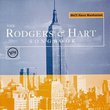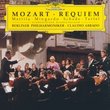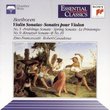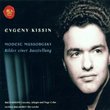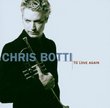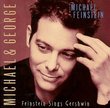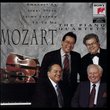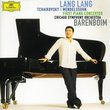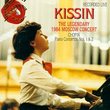| All Artists: Franz Lehar, Otto Ackermann, Elisabeth Schwarzkopf, Nicolai Gedda, Erich Kunz, Emmy Loose, Anton Niessner, Otakar Kraus, Josef Schmidinger, Hella Kurty Title: Lehár: Die lustige Witwe / Schwarzkopf, Gedda, Kunz, Ackermann Members Wishing: 0 Total Copies: 0 Label: EMI Release Date: 10/25/1990 Album Type: Import Genre: Classical Styles: Opera & Classical Vocal, Historical Periods, Modern, 20th, & 21st Century Number of Discs: 1 SwapaCD Credits: 1 UPC: 077776952024 |
Search - Franz Lehar, Otto Ackermann, Elisabeth Schwarzkopf :: Lehár: Die lustige Witwe / Schwarzkopf, Gedda, Kunz, Ackermann
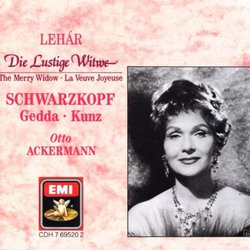 | Franz Lehar, Otto Ackermann, Elisabeth Schwarzkopf Lehár: Die lustige Witwe / Schwarzkopf, Gedda, Kunz, Ackermann Genre: Classical
This is among the best Viennese operetta recordings ever made. Taped in 1953 as part of EMI-Angel's series of "champagne operettas," it captures the waning years of the Vienna State Opera's postwar ensemble in ways that t... more » |
Larger Image |
CD DetailsSynopsis
Amazon.com This is among the best Viennese operetta recordings ever made. Taped in 1953 as part of EMI-Angel's series of "champagne operettas," it captures the waning years of the Vienna State Opera's postwar ensemble in ways that the same label's 1958 stereo remake did not. The story of rich and royal personages afoot in glamorous Paris is captured in the lilting phrases that hover gracefully around cadences, seconded by conductor Otto Ackermann's flexible, genial tempos that never fall into sentimentality. Among the singers, Elisabeth Schwarzkopf's voice has a special luster here, while Nicolai Gedda is captured at his youthful, vocally flexible best. Erich Kunz teases and charms Lehár's musical lines as Danilo while Valencienne is sung by the little-known Emmy Loose, whose voice has a radiant warmth. Sound quality is as good as mono gets. --David Patrick Stearns Similarly Requested CDs
|
CD ReviewsKunz and Gedda at their best! 01/17/2000 (5 out of 5 stars) "Having heard quite a number of performances, this recording is still the one that I will go back with great pleasure. Gedda and Kunz are simply gorgeous. The meltingly beautiful love duet between Gedda and Emmy Loose has never, never have been matched. Kunz's Danilo makes all the authentic tenor Danilos sound like a little boy. Kunz's charming, gently seductive voice was made to sung this role. Schwarzkopf is in better voice here than in the remake and she too beat pretty much all the competitors (with the possible exception of Hilde Gueden). Emmy Loose's lovely voice adds extra glory to the wonderful cast. Ackermann's conducting may not have the incisiveness of Matacic, but has a beautiful, nostalgic atmosphere that is quite appropriate for the music. The recording is in mono, but has a fine warm quality, unlike many of the metallic sounding digital recordings. In short, this is a gem!" The Best! 06/26/2000 (5 out of 5 stars) "Listeners who want to hear the very best recording of perhaps the best Viennese operetta should listen to this one. Gedda, Schwarzkopf,and Loose are splendid, but Kunz's witty, warm combination of dialog and singing provides the spice wich makes this an extremely satisfying performance." Famous Vienna State Opera performance with miscast Danilo L. E. Cantrell | Vancouver, British Columbia Canada | 11/11/2004 (3 out of 5 stars) "This a famous recording and a widely-beloved one. It displays the charm and effervescence of the Vienna State Opera in the artistic glory days of the post-War period. All the principal singers are justly famous and the performance is a landmark against which all subsequent performances must be measured. All this would normally justify a five-star rating.
While the performance is a landmark, it seems to me that it falls well short of perfection. Charm and effervescence are certainly present, but they should not be mistaken for authentic tradition. When this recording was made, the Merry Widow was a relative newcomer to the repertory of the Vienna State Opera, which in earlier days had taken a very top-lofty attitude toward such trifles as mere operetta. (The great Richard Tauber had been forced to defend himself against that very attitude. "I don't do operetta," he had declared, "I do Lehar!") Elizabeth Schwarzkopf offers an unforgettable portrait of Hanna Glavari. But it is obviously a very, very studied portrait. Frankly, I'd be happier with a Merry Widow who is less thoughtful and a great deal more merry. Nicolai Gedda sings beautifully, gloriously sailing over the high-lying role of Camille. But consider Camille in dramatic terms. He is a rich, lovesick, not very bright young man who is under more or less continuous strain because he has little understanding of what is going on around him and who loses the love of his life (or at least of his weekend) at the end of the show. Ideally, some stress should show up in his singing. It does not with Gedda. Emmy Loose is perhaps the least-remembered member of this cast. She is terrific here as Valencienne. Erich Kunz was a baritone who achieved well-earned acclaim in the operas of Mozart and Richard Strauss, as well as fame in operetta. In appraising his Danilo, I find myself in hearty agreement with the opinion often expressed by Mr. Kolenkhov in Kaufman and Hart's You Can't Take It with You: "Confidentially, he stinks." Kunz was simply not up to singing the tenorish line of Danilo as written by Lehar, so the part was lowered for his benefit. That is bad enough, but why would the worldly and witty widow waste even two minutes of her time on Kunz's charmless, snarling, whining, drunken lout of a Danilo? That she would give her money AND herself to such a distasteful wretch is inconceivable. Kunz is ubiquitous in German language operetta recordings of his era. He is passable as the revenge-minded Dr. Falke in Der Fledermaus but hopeless as a romantic lead. Nevertheless, that is how he was cast in operetta after operetta. The Austrians must have heard or seen something attractive in him. I do not. The mono sound on the recording is very good for its time and acceptable in ours for anyone who does not obsess over the mere mechanics of sound reproduction." |

 Track Listings (31) - Disc #1
Track Listings (31) - Disc #1